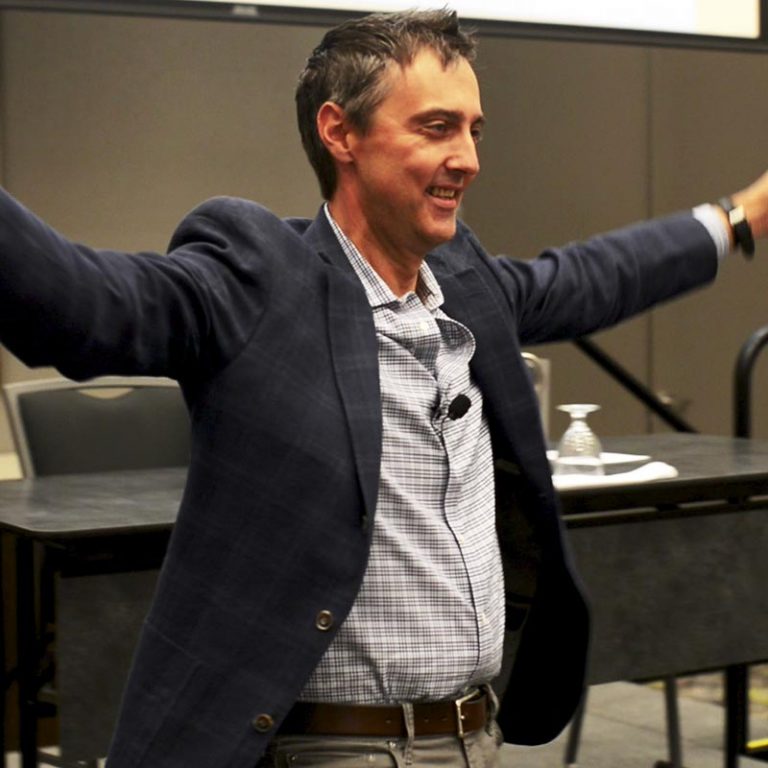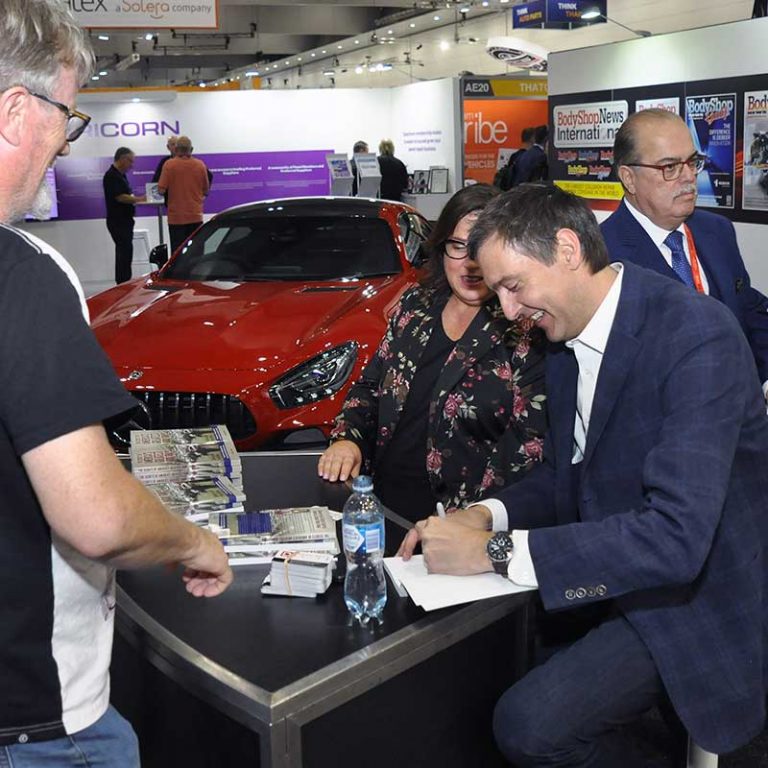How Bill Marsh Automotive Group in Michigan Is Addressing the Technician Shortage & Managing its Work in Process (WIP)
By Stacey Phillips Ronak, Radiant Writing
At Bill Marsh Automotive Group, founder Bill Marsh, Sr., often told employees, “Remember, we’re not in the car business… we’re in the people business.” Ron Grigal, a director of the auto group and general manager of the company’s body shop, said that still holds true today. Since joining the business in 1989, Grigal has found that the focus on customer service, employee loyalty and creating processes has driven their success.
The company dates back to 1982 when Marsh, Sr. took ownership of a struggling Buick dealership in Traverse City, MI. Within a year, it became the top-performing dealership in the area. Since then, the family-owned business based in Traverse City has grown to include eight new vehicle manufacturers, a multi-location used car dealership, three Byrider dealerships, Brake & Alignment Plus+, Bill Marsh Body & Paint, and Thrifty Car Rental. The company also has locations in Kalkaska, Gaylord, Saginaw and Grand Rapids.

Leading by Example
In a shop with 26 employees, Grigal realizes how critical it is for team members to clearly understand what is expected, ensure they agree and provide them with the space and freedom to complete tasks in the timeframe allotted to ensure proper repairs.
“If I’m not clear with them on what they need to be doing, I’m not setting them up for success,” he shared. “When they agree to the terms of the conversation and say ‘yes,’ I let them go get the task done.”
This applies to big and small projects, whether a technician is finishing a repair or a manager ensures his team meets their goals.
When a project is complete, Grigal follows up to discuss if it turned out as expected and to show appreciation.
“If something didn’t go right, we figure out why and go back and do it better the next time,” he said.
Addressing the Technician Shortage
Like other businesses, one of Grigal and his team’s biggest challenges is finding technicians.
“We have nowhere near enough and more work than we know what to do with right now,” he said.
He said the problem should have been addressed a decade ago to ensure shops could fill the needed roles as many in the workforce retire.
“There are not enough good technicians out there to satisfy the demand,” he noted. “The way forward is to recruit, train and develop good people into this industry.”
Rather than using traditional hiring methods, Grigal said the industry must find people with the core assets to do the job and make it attractive to them.
“We have to start today or suffer later,” he added.
He warns shops against stealing body shop technicians from other facilities.
“Poaching does nothing more than create stress and disruption and drive up the cost for other shops,” he said.
He also cautions shops about using the flat-rate pay system.
Over the last few years, Grigal revised how technicians were compensated. Rather than using a flat-rate model, the company implemented a team-based approach in which technicians are paid based on the cumulative hours of the shop.
“Essentially, everyone is paid off of everybody’s work,” explained Grigal. “We have people in our industry who are willing to train new people and share what they know but if we’re not compensating them for that, they likely won’t have any interest in doing it.”

Implementing a Manageable Work in Process (WIP)
Another challenge Grigal noted is the capacity problem compared to a decade ago. This is partly due to consolidation and the recession, which caused many shops to close.
In 2020, the shop was looking to update its production process. Grigal said there was a ‘tsunami of work’ and a floodgate of pent-up demand.
The company’s work in process (WIP) continued to grow by about one or one and a half cars per day, up to 300 waiting to be repaired.
Grigal said the quick growth was causing some chaos in the shop, with vehicles everywhere.
“We are hyper-vigilant about our daily production plans,” he explained. “When something goes wrong, it has an accordion effect.”
He and his production manager, Alix Shively, ultimately argued about why the shop was having challenges managing the same number of vehicles they had repaired prior to COVID. Shively suggested it could be due to the mix of cars and shared an article about Elite Body Shop Solutions’ Production Scheduling Tool.
After signing up for Dave Luehr’s Elite Body Shop Academy and watching several videos, Grigal agreed that the mix of vehicles was causing problems and reached out to Luehr and his team.
“I had been looking for someone in the industry who had some ‘freshness’ and a positive, proactive and upbeat point of view about auto body repair,” he said. “Most people you meet kind of bring you down, whine and complain about the insurance companies and rates.”
Grigal began using the scheduling tool to analyze his shop’s work mix. From his experience working on the service side of the business for 17 years, he said you don’t typically bring in three engine overhauls a day. Instead, you bring in an engine overhaul, a brake job and an oil change.
“Every job isn’t equal and what Dave and his team have done with the scheduling tool is decode the collision repair work mix,” he said. “It’s brilliant.”
After adjusting their process, they had to wait before realizing the benefits because jobs were booked out three to four months in advance. Ultimately, workflow improved and they were able to determine the tasks that needed to be done daily and match the skills sets with technicians.
The shop now divides work into categories and brings in a certain amount based on historical data in the estimating system. This has decreased WIP to about 250 committed jobs with an output of approximately eight vehicles per day.
“It’s a game changer,” said Grigal. “We started seeing WIP go down and volume go up. It’s changed everything for the better.”
Not only has the scheduling tool helped decrease WIP, but it has also given staff more confidence in telling people the target date their cars will be repaired and managing their expectations.
“Most shops aren’t doing that, but the scheduling tool has made that much more predictable and accurate,” said Grigal. “We typically run probably 95% on time and somewhere short of 50% ahead of schedule, which really helps build our brand.”
After finding success with the scheduling tool, Grigal began using the Elite Operating System in August 2022 to help write their playbook and standard operating procedures (SOPs).
“It has been a lot of work, but it has been worth it,” said Grigal. “It has been a really great experience working with Dave, Brent and the team.”

Can you share information about your SOPs?
While updating the shop’s processes, the team found that some SOPs were outdated.
“Rewriting and updating your SOPs forces you to look in the mirror and say, ‘Am I doing what it is that I say I’m supposed to be doing?’” said Grigal. “That’s where the rubber hits the road and where the real work begins.”
Although Grigal said it’s great to have ideas, it’s the action taken that really counts. They’ve discovered there were a lot of steps that were overlooked or forgotten but are now part of the playbook to hold everyone accountable.
The new playbook with updated SOPs and instructional videos has helped their business in many ways. For example, when Grigal hired a new part-time employee to fill a role for someone promoted, the new hire followed the playbook to learn the job.
“He was able to be operational within several days instead of several weeks,” noted Grigal. “That really made everybody’s job, especially, the new person coming in who didn’t know what he was doing, a much smoother transition.”
Learnings from the Service Side of the Business
Over the years, Grigal has experienced many changes in the industry, including the growth of Advanced Driver-Assistance Systems (ADAS) features.
He said this is a great development from a process standpoint of repairing vehicles.
“Service departments, at least in dealerships, have always been very process-driven, organized and proactive,” said Grigal. “That lends itself well to the body side of the business.”
Grigal said that working in the service department helped him see the collision repair industry through a different lens.
In recent years, he has found that collision repair owners and managers are bringing in technicians from service to assist with the new technology-related features in cars.

Advice to Operators
While addressing the changes and challenges over his career at Bill Marsh Automotive Group, Grigal still ensures the team has fun and recommends shop owners and managers do the same.
“We try to create a good environment because this is a tough business,” he said. “Sometimes, we fight a little bit, but at the end of the day, everybody gets along and we enjoy what we do.”
Grigal said there’s something about getting up, walking out the door and wanting to go to work.
During a recent shop meeting, Grigal asked employees to raise their hands if they came into the business to get rich. Not one hand went up. However, when he asked how many joined the industry because they enjoy working on cars and still do, everyone raised their hands.
“That includes me,” said Grigal. “Although it’s business, you must make work fun for your team.”
Ron Grigal’s incredibly successful career has a powerful lesson:
Improvement doesn’t happen by accident. It takes a deliberate choice to continue learning.
No matter our level of success, we can go so much further with others input, looking at our business and processes with a fresh perspective, and setting aside the ego to make changes.
That doesn’t mean it’s easy! If you, like Ron, want the input of an expert, schedule a free 1-on-1 consultation with Dave Luehr. This isn’t a sales call; it’s an opportunity to get clear on your next few actions toward improvement!
Click here and schedule a strategy session with Dave Luehr!
Elite is all about taking action in your business! Subscribe to Elite’s YouTube channel and join the Elite Body Shop Community on Facebook to connect with the most positive, forward-thinking group of collision repairers in the industry.













